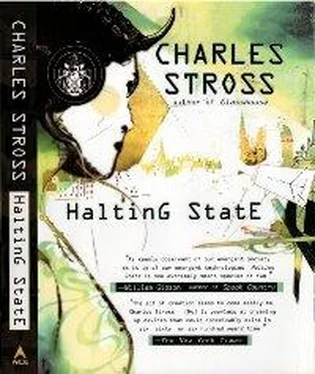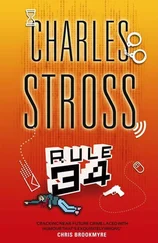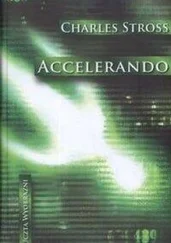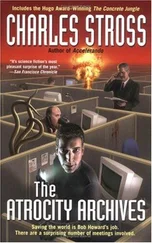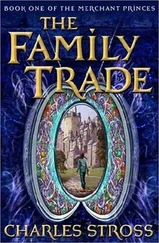Jack glances at you sidelong while the middle-aged spookmaster is fumbling to articulate whatever it is he’s got stuck in his mind. His expression is so dry you have to bite your lip. Dry as in tinder-dry. Jack’s finally getting angry, and you’ve got a feeling that you don’t want to be inside the blast radius when he goes off. “Jack’s niece,” you prompt Michaels. “What makes you think she’s safe?”
“Well, for starters there’s the fact that she’s been abducted by the procedural content engine from a role-playing game, rather than a slavering paedophile. In fact, if this is the usual way these things play out, she probably doesn’t even know she’s been kidnapped as such, any more than you realized you were being taken out of circulation by a rival intelligence agency in Amsterdam. It’s all just a game to her. Look, I can promise you that we’re working on it, and I won’t be lying. But, in all honesty—we can’t just call the local police and tell them to go in with tasers drawn. Firstly, we’re not sure where she is, yet, and secondly, if the police find her too fast, it’ll tip the opposition off that we’re onto their game. That would be disastrous—it would invite escalation—”
And then Jack blows his top.
“What the fuck is that supposed to mean? It seems to me that we’ve already been pretty fucking escalated, all the way into a gravel quarry if we hadn’t broken out! Chen was scared shitless—he thought someone was going to try to kill him—and I’ll bet you that if he shows up again, it’ll be in an organ bank. These fuckers aren’t playing games, Mister Spook, sir, in case you’ve forgotten there are several million euros missing—”
You’ve got a very peculiar feeling that Jack is playing some kind of game with Michaels, but you haven’t got a clue what the rules are. And then Michaels shakes his head. “That’s irrelevant.”
You can’t keep your mouth shut at that. “What do you mean, it’s irrelevant? What are we here for, then?”
“That’s what I’m trying to tell you.” Michaels breathes heavily. “Are you going to listen?”
“ Fuck no, I’m trying to tell you you’ve been—” But that’s just the tail-end of Jack’s venting, and he manages to shut himself up before he really puts his foot in his mouth. He’s not stupid, is Jack; unlike some of the geeks you’ve known in your time, he can get a message if you hit him over the head with it hard enough. (He seems to be housetrained, he’s not pushy, and he doesn’t smell bad: If it wasn’t for the tee-shirts and furtive programming runs, he’d have trouble hanging on to his geek licence.) “Go on, please,” he says, with a very odd look on his face.
“Thank you. Let me lay out a few things first, by way of establishing a context. This is about national security, and, if you’re anything like the civilians I’ve dealt with in the past, you’re about to ask what it’s got to do with you. So I’d like to nail that down first so we can skip the stupid questions later. Clear?”
You nod, warily. National security is a weasel term that covers a multitude of sins, but you’ll let it pass for now. Whose national security? is the next question you’ve got in mind…
“This is the twenty-first century, and we’re in the developed world. You’re probably thinking wars are something that happens in third-world shit-holes a long way away. And to a degree, you’d be right. Modern warfare is capital-intensive, and it hasn’t really been profitable for decades; it was already a marginal proposition back in 1939 when Hitler embarked on his pan-European asset-stripping spree—his government would have been bankrupt by March 1940 if he hadn’t invaded Poland and France—and it’s even worse today. When the Americans tried it in Iraq, they spent nine times the value of the country’s entire oil reserves conquering a patch of desert full of—sorry, I’m rambling. Pet hobby-horse. But anyway: Back in the eighteenth century, von Clauswitz was right about war being the continuation of diplomacy by other means. But today, in the twenty-first, the picture’s changed. It’s all about enforcing economic hegemony, which is maintained by broadcasting your vision of how the global trade system should be structured. And what we’re facing is a real headache—a three-way struggle to be the next economic hegemon.”
Who is we? That’s the question you’re asking yourself…
“‘We,’ for these purposes, is the intellectual property regime we live in—call it the European System. The other hegemonic candidates are the People’s Republic of China, and India. America isn’t in play—they’ve only got about three hundred and fifty million people, and once we finish setting up the convergence criteria for Russian accession to the Group of Thirty, the EU will be over seven hundred. China and India are even bigger. More to the point, the USA went post-industrial first. Their infrastructure is out-of-date and replacing it, now oil is no longer cheap, is costing them tens of trillions of euros to modernize. Plus, they’ve got all those rusty aircraft carriers to keep afloat. It’s exactly the same problem Britain faced in the 1930s, the one that ultimately bankrupted the empire. But today, our infrastructure—Europe’s—is in better shape, and the eastern states are even newer. They went post-industrial relatively recently, so their network infrastructure is almost as new as the shiny new stuff in Shanghai and New Delhi. So there’s this constant jockeying for position between three hyperpowers while the USA takes time out, and you live in one of those powers, in case you hadn’t noticed.”
“I live in Scotland,” Jack points out.
“But Scotland is part of the British Isles Derogation Zone, which in turn is part of the European Union, yes? What I’m trying to make clear here is that what’s good for the EU is good for Scotland, and England. And what’s playing out here is potentially very bad indeed , both for the country you live in, and eventually, for you.”
If you let them badger each other indefinitely, you could be stuck in this bunker until Christmas. And that would never do: The instant coffee is bogging, and you can’t check your email. “Okay, so just what is going on?” you ask Michaels, smiling as sweetly as possible to conceal your irritation.
“Quantum key exchange!” Michaels snaps. As far as you’re concerned, he might as well have said “abracadabra,” but the effect on Jack is electrifying.
Michaels smiles. “Now that I’ve got your attention…”
Jack nods like a puppet on a string.
“Until about five years ago, progress in electronics was governed by something called Moore’s Law—are you familiar with it? Make a circuit smaller, it dissipates less heat, so it can run faster, and you can cram more components onto a chip of a given size. It began to bottom out in the oughties, when we began hitting the quantum-scale limits to conventional electronics. But at about the same time, scientists began trying to develop so-called quantum processors, and don’t tell me how they work—it’s all gibberish to me. But the long and the short of it is, a quantum processor can do certain types of calculation not simply very fast, but to all intents and purposes instantaneously . And among the classes of operations they’re good for, the foremost is code-breaking.”
“But if you use quantum key distribution,” Jack says slowly, “that resets the balance point in the arms race. Doesn’t it?”
This is already about two steps beyond you, but you focus on it intently: There’ll be time to do the homework once you get your mobile back.
“Yes and no. Quantum key distribution”—Michaels looks at you—“lets you secure your regular encryption keys so that there’s no risk of anyone else getting their hands on them, which is what makes them vulnerable to quantum code-breaking. But it’s something you do strictly over secure fibre-optic cable. Our entire mobile communications infrastructure, from 3G on up through 4G and NG and 802.20, is impossible to upgrade to QKD. The next generation system will be secure—but right now, we’re wide-open to anyone with a couple of million euros and a bunch of carrier-grade fibre—and a copy of the one-time pad used to secure supervisor access to our core backbone routers. Which, incidentally, is why we’re sitting in a shielded bunker equipped with no communications technology invented after 1940. About the only consolation is that the opposition is also wide-open, right now, and that’s why we’re going through the biggest renaissance in HUMINT—HUMan INTelligence—since the Cold War. It’s all mediated through artificial reality and live-action role-playing games like SPOOKS, in case you hadn’t guessed: adding the power of electronic information gathering to human espionage. Would you believe it used to cost us ten thousand euros a day to put a full surveillance team on a suspect? Now we’ve got volunteers who’ll pay us to let them do our leg work!”
Читать дальше
